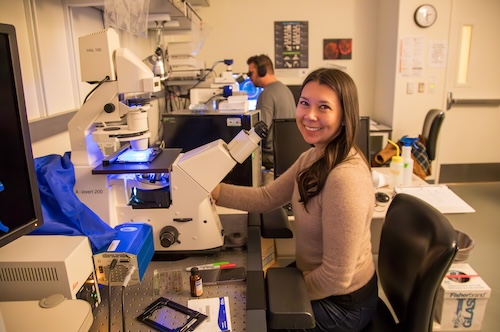Campus News
Two UC Santa Cruz scientists named 2024 Sloan Research Fellows
Assistant Professors Roxanne Beltran and Jacqueline Kimmey have been awarded Sloan Research Fellowships, one of the most prestigious honors bestowed on early-career scientists, each receiving $75,000 to delve into new areas of research in their respective fields of marine ecology and microbiology.

Elephant seals as climate sentinels
Beltran, in the Ecology & Evolutionary Biology Department, leads elephant seal research that uses sensors attached to the animals to monitor the world’s oceans for climate change impacts as they migrate. Beltran also advances the movement toward research experiences that are more inclusive of students from historically marginalized backgrounds through the publication of widely used guidelines on topics such as field safety, anti-racism, and open data.The Sloan award will now allow Beltran to pioneer new approaches to answer questions about how changing environmental conditions impact populations and marine ecosystems by impacting individual animals’ abilities to survive and reproduce. The award will also provide “transformative training opportunities for hundreds of undergraduate students, with a focus on underrepresented minority students,” UC Santa Cruz Professor Rita Mehta, chair of the Ecology & Evolutionary Biology Department, stated in her nomination letter to the Alfred P. Sloan Foundation.
“The six-decade research program has laid important groundwork by teaching us that elephant seals undertake extraordinary migrations halfway across the Pacific Ocean, diving to dark depths in search of fish and squid to eat,” Beltran said. “With funding from the Sloan Foundation, my team and I can now begin to understand how shifting ocean conditions are impacting food resources for marine vertebrates, and in turn, how their ability to survive and reproduce may be threatened in our changing world.”
Infection’s Influence on Biological Patterns
Kimmey, in the Microbiology & Environmental Toxicology Department, focuses on circadian rhythms – the cellular timekeeping system that regulates sleeping, eating, and a variety of physiological responses – and how the clock is affected by microbes. She has pioneered several approaches to explore interactions between circadian rhythms and infectious disease. Using cell culture, she recently discovered that exposure to Streptococcus pneumoniae, a leading cause of bacterial pneumonia, can “reset” the circadian clock of vertebrates.
“Our circadian clock isn’t just about sleep – it affects nearly all biological processes. Clinical data, and honestly, our own personal experiences, tell us that infections can disrupt our normal biological patterns – you may experience fatigue, sleep more, or lose your appetite,” Kimmey said. “With this funding from the Sloan Foundation, we can now investigate how invasive infections such as sepsis and meningitis affect neural circadian rhythms, and one day, hopefully leverage this information to optimize clinical therapeutics and improve disease outcome.”
Beltran and Kimmey are among 126 early-career scientists in the United States and Canada to be named 2024 Sloan Research Fellows. Open to scholars in seven fields – chemistry, computer science, Earth system science, economics, mathematics, neuroscience, and physics – the Sloan Research Fellowships are awarded in close coordination with the scientific community. Candidates must be nominated by their fellow scientists and winners are selected by independent panels of senior scholars based on a candidate’s research accomplishments, creativity, and potential to become a leader in their field.
Founded in 1934, the Alfred P. Sloan Foundation is a not-for-profit grantmaking institution dedicated to improving the welfare of all through the advancement of scientific knowledge. For more information, see the full list of the 2024 Fellows.